Five Sports Movie Commentaries Worth Listening To
Commentaries for sports movies are great for a variety of reasons. One of the biggest reasons why, of course, is hearing stories about whatever legendary actor is playing the coach. More often than not, directors are excited to talk about those iconic actors. Want to know how so-and-so gave a famous locker room speech such bravura? Then check out the audio commentary.
Another reason to listen given them a listen is to learn how much of a pain it can be making actors, locations, and everything else look like the real deal. The attention to detail in some of the films featured below is remarkable and more often than not subtle. If you want to see what filmmakers put them through to make a sports picture, then maybe give a listen to one of our audio commentary recommendations.
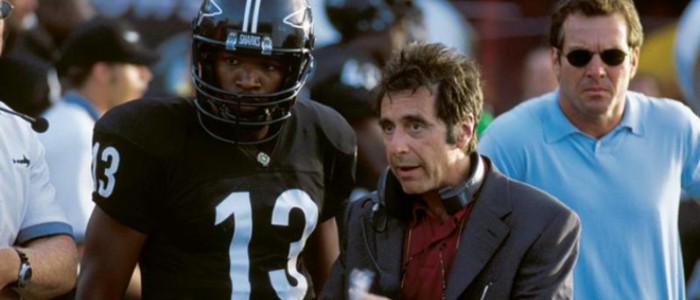 Any Given Sunday (Featuring co-writer/director Oliver Stone)Why Listen: Plenty of great directors struggle to maintain one's attention during an audio commentary for a movie close to three hours long. Not Oliver Stone. The filmmaker is never at a loss for words discussing his epic drama. He says Any Given Sunday was harder to make than Born of the Fouth of July and other brutally difficult films. There was the limited shooting schedule, all the scenes and shots they had to get, and having to deal with the uncooperative NFL. Stone candidly discusses the intense "marathon"; he even talks about the day LL Cool J and Jamie Foxx fought. If you want to learn how Stone captured the world of football so viscerally, or learn about Stone's process as a storyteller, then listen to this funny and wise commentary.A Day on the Job: When Christina (Cameron Diaz) argues with Tony (Al Pacino) about starting Cap (Dennis Quaid), it was Diaz's first scene with Pacino — whom some actors felt, if not intimidated, perhaps a little inadequate around. Stone is one of the many directors to mention how Pacino absorbs all of his lines:
Any Given Sunday (Featuring co-writer/director Oliver Stone)Why Listen: Plenty of great directors struggle to maintain one's attention during an audio commentary for a movie close to three hours long. Not Oliver Stone. The filmmaker is never at a loss for words discussing his epic drama. He says Any Given Sunday was harder to make than Born of the Fouth of July and other brutally difficult films. There was the limited shooting schedule, all the scenes and shots they had to get, and having to deal with the uncooperative NFL. Stone candidly discusses the intense "marathon"; he even talks about the day LL Cool J and Jamie Foxx fought. If you want to learn how Stone captured the world of football so viscerally, or learn about Stone's process as a storyteller, then listen to this funny and wise commentary.A Day on the Job: When Christina (Cameron Diaz) argues with Tony (Al Pacino) about starting Cap (Dennis Quaid), it was Diaz's first scene with Pacino — whom some actors felt, if not intimidated, perhaps a little inadequate around. Stone is one of the many directors to mention how Pacino absorbs all of his lines:
This was their first scene together, and Cameron had a hard time. She was nervous. She was working with Al. He's a very experienced pro. She felt like many would feel, you know, a little inadequate. I tried to give her as much confidence as possible. But when you have your lines under your belt totally — totally, totally – like Al does or Anthony Hopkins, then you can feel free to play around. You're not struggling to remember. They're a part of your subconscious. I think Pacino is magnificent in this movie. For me, he achieves a new level of wisdom, pathos, and tiredness.
What's Said: Stone often praises Diaz as an actor, especially for trying to push herself and trying new things. She does what Stone thinks all artists must do and are often criticized for:
I think the only way to grow as a person and as an actress is to stretch yourself. Unfortunately, when you stretch yourself sometimes people don't understand, and tear you apart, and they attack you for that. I don't think those people understand it's necessary for all creative people to make attempts at something that's larger than themselves. Sometimes they succeed, and when they do, they're fearless. When they don't [succeed], they're vilified. I don't think that's fair. I think somehow there's a saner balance.
Trivia: There was only one image shaker in the United States, which Steven Spielberg used on Saving Private Ryan. "I wanted to get that feeling of the earth rumbling," Stone said of the image shaker's effect during the games.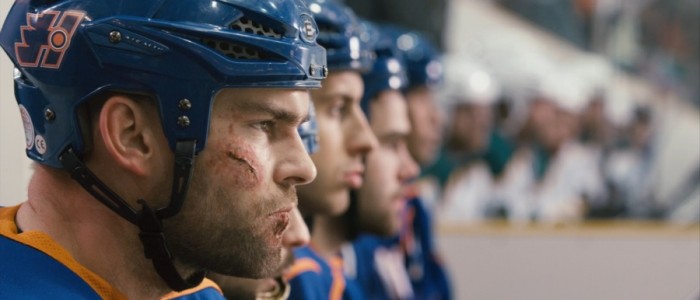 Goon (Featuring Director Michael Dowse and co-writer/co-star Jay Baruchel)Why Listen: Because Baruchel and Dowse are hilarious. If there's one commentary on this list I'd recommend to anybody, it's this one. The second time I listened to this commentary it was every bit as funny, dirty, and informative. While Baruchel and Dowse have a great time joking around, they don't forget to actually discuss the movie, which happens often in more comedic commentaries.A Day on the Job: After Pat (Baruchel) and Xavier (Marc-André Grondin) have their spitting match, Dowse shares a "great story" about the fake spit, which was made out of water and banana:
Goon (Featuring Director Michael Dowse and co-writer/co-star Jay Baruchel)Why Listen: Because Baruchel and Dowse are hilarious. If there's one commentary on this list I'd recommend to anybody, it's this one. The second time I listened to this commentary it was every bit as funny, dirty, and informative. While Baruchel and Dowse have a great time joking around, they don't forget to actually discuss the movie, which happens often in more comedic commentaries.A Day on the Job: After Pat (Baruchel) and Xavier (Marc-André Grondin) have their spitting match, Dowse shares a "great story" about the fake spit, which was made out of water and banana:
Dowse: I remember they were testing it for days before, and it was on the rink. I was so tired, it was five in the morning, and somebody comes up to me and all I hear is, 'Spit, test, banana.' I just take the cup, and I'm just suppose to take a look and approve it, and I spit in it.
Baruchel: That's what you thought? 'Spit test? Ah, okay!'Dowse: It's a great story.Baruchel: There ya go. If you're ever next to Dowse at a party, get him to tell you about the time he spit into the fake spit.What's Said: The two get giddy during the big match between Doug and Ross Rhea (Liev Schreiber). The two aimed high with the sequence, which involved 65 camera setups and +120 shots.
Dowse: They're just fucking going toe-to-toe, man. There's nothing remotely funny or light about it. It is the fucking climax, right?
Dowse: We sort of held out for this fight. We had a lot longer versions of some of the other fights. We felt everything had to build up to this. If we wanted this fight to be effective, I guess you could call it 'punch fatigue.' It could kind of lose its impact. We showed restraint, if you can believe it, in the first four reels of the film and then really let it go in this.Baruchel: It had to be the greatest hockey fight ever seen and one of the greatest film fights ever seen. I go as far to say–ahh! [reacting to Doug's ankle snapping.]Dowse: There was much worse versions of that [shot].
Dowse adds it was Schreiber's idea for Rhea to smile after the fight.
Trivia: Most of the last names on the jerseys are less than four letters. It saved money.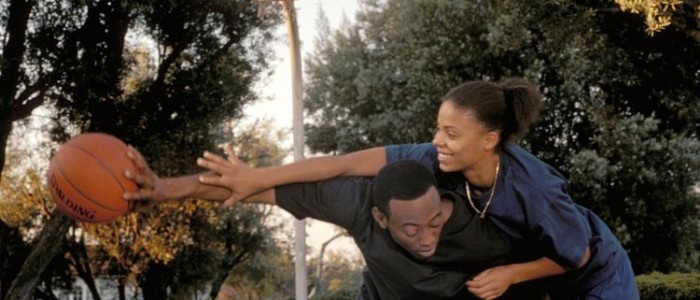 Love & Basketball (Featuring writer-director Gina Prince-Bythewood and actor Sanaa Lathan)Why Listen: Prince-Bythewood played basketball. She knows the game, so the director has a strong radar for what's authentic. If the smallest of detail is off about a play or a move, she'll shine a light on it. She went to great lengths to stay truthful, though, especially during the casting process (more on that later). The Love & Basketball commentary would make for a good double-feature with the Goon track. Prince-Bythewood and Lathan, like Baruchel and Dowse, have a fantastic rapport. All the laughs aside, they're honest with one another and have plenty of stories to tell about each other. There's no dead air in this commentary.A Day on the Job: Prince-Bythewood originally wanted to cast a basketball player, not an actor, as the lead. When Sundance asked if she'd do a reading of the script well before the movie got made, she quickly said yes. After an actor dropped out of playing Monica in the reading, Lathan, as a favor, came in for the reading. The reading was a huge opportunity for Prince-Bythewood, but the rehearsal for the reading didn't go great.
Love & Basketball (Featuring writer-director Gina Prince-Bythewood and actor Sanaa Lathan)Why Listen: Prince-Bythewood played basketball. She knows the game, so the director has a strong radar for what's authentic. If the smallest of detail is off about a play or a move, she'll shine a light on it. She went to great lengths to stay truthful, though, especially during the casting process (more on that later). The Love & Basketball commentary would make for a good double-feature with the Goon track. Prince-Bythewood and Lathan, like Baruchel and Dowse, have a fantastic rapport. All the laughs aside, they're honest with one another and have plenty of stories to tell about each other. There's no dead air in this commentary.A Day on the Job: Prince-Bythewood originally wanted to cast a basketball player, not an actor, as the lead. When Sundance asked if she'd do a reading of the script well before the movie got made, she quickly said yes. After an actor dropped out of playing Monica in the reading, Lathan, as a favor, came in for the reading. The reading was a huge opportunity for Prince-Bythewood, but the rehearsal for the reading didn't go great.
Prince-Bythewood: We sit down to do it [to rehearse it] . Everyone is acting, but I was... Sanaa was awful. Awful! As soon as it was done, I talked to every other actor and gave them little notes. I saved Sanaa for last. She had to sit and wait, because I had a freaking bucket full of [notes].... I called my husband, 'Reg, my life is over, I have to recast her. She was awful. Who can I get? I cannot have her do it. I have to fire her. God, I've never fired anyone before. How am I going to do this?' It was so scary, but at the end of the day, I couldn't do anything. Finally, it came time for the reading, and it was a packed house, which was cool. I sat there with my husband, who had heard my whole tirade, and I swear it was three words out of Sanaa's mouth and I was like, 'It was a totally different person.' She was amazing. It was a magical night.
During the rehearsal for the reading, Lathan was still reading the script for herself. She wasn't "on," as she was still figuring out how to perform, having only read the script the first time the night before. She planned on performing it entirely differently the night of the reading, which Prince-Bythewood didn't know. Even after that "magical night," the director still wanted to cast a basketball player. How Lathan was cast is a long, long story that's the highlight of the commentary.
What's Said: Lathan fought hard for the role. For a few months, she trained and practiced for a role she didn't know she'd get. They laugh about the experience now, but well before Lathan was hired her job had started:
So many people were like, 'Pass on this,' because they thought it was abusive, emotionally abusive, the way they expected me to do all this work all these months with no guarantee of the part. We knew they were seeing other people. It was like having me on hold, but me and my manager both thought the part was worth fighting for. I had to justify it in my head like, 'Okay, at least I'm getting in shape.' Even my little sisters were like, 'When do you start the movie?' 'I don't have it yet.' They'd look at me like I was crazy.
Prince-Bythewood said a director dreams about having an actor that passionate about a part, which is a part of the reason why she cast Lathan.
Trivia: Spike Lee, who directed Ray Allen in He Got Game, told Prince-Bythewood to cast a real basketball player as the lead.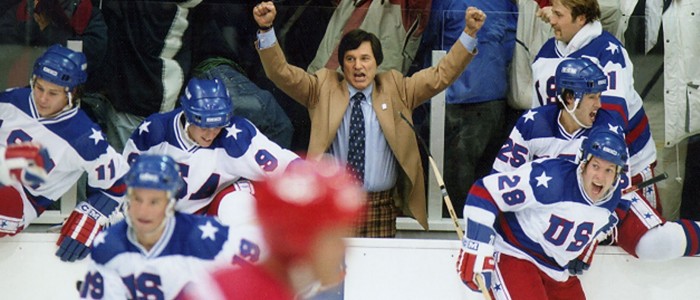 Miracle (Featuring co-writer/director Gavin O'Connor, cinematographer Dan Stoloff, and editor John Gilroy)Why Listen: Miracle is a movie made with passion, which the audio commentary is a reminder of. It's a rare commentary where a participant says "I love this scene," but they can actually back up why. There's no back patting, only affection for a movie that came out beautifully after overcoming some challenges. There are so many variables in shooting hockey games. Like Any Given Sunday, this track gives a great breakdown of what it takes to craft some believable players and games. The track goes into dealing with crowds, turning athletes into actors, how they captured iconic moments from the real games, and more. The commentary also features plenty of stories about Kurt Russell, who's always trying to support the story the best he can.A Day on the Job: O'Connor spends a good amount of time praising Russell's moving performance and work ethic. What he also appreciated about the actor was how he expressed trust:
Miracle (Featuring co-writer/director Gavin O'Connor, cinematographer Dan Stoloff, and editor John Gilroy)Why Listen: Miracle is a movie made with passion, which the audio commentary is a reminder of. It's a rare commentary where a participant says "I love this scene," but they can actually back up why. There's no back patting, only affection for a movie that came out beautifully after overcoming some challenges. There are so many variables in shooting hockey games. Like Any Given Sunday, this track gives a great breakdown of what it takes to craft some believable players and games. The track goes into dealing with crowds, turning athletes into actors, how they captured iconic moments from the real games, and more. The commentary also features plenty of stories about Kurt Russell, who's always trying to support the story the best he can.A Day on the Job: O'Connor spends a good amount of time praising Russell's moving performance and work ethic. What he also appreciated about the actor was how he expressed trust:
It must've been below zero on this night [we were shooting]. This is probably the second or third day of shooting. Kurt comes up to me and says, 'Gavin, I gotta wear a hat. I'm freezing. Do you think Herb would wear a hat?' I said, 'Yeah, I think if it's freezing, Herb would wear a hat.' I got my costume designer to bring out a box of hats. We were standing by the monitors, and Kurt starts putting on hats. He'd put on a hat, and then I'd say no. Then he'd put on another hat. 'No.' We went through six or seven hats before the one you're looking at there. He looked at me and I went, 'That's perfect. That's a Herb hat.' Kurt looked me and said, 'All right, let's go shoot.' He walked away from me and sat on the bench. Patty Clarkson was standing there, just in shock and said, 'Isn't he going to look at himself in the mirror to know if the hat works or not?' I said, 'Apparently not.' That told me so much about Kurt as an actor, and maybe about his trust in me and what we were trying to do. I don't know many actors who would put a hat on and not look at themselves to see what they look like in the hat.
What's Said: The "again" scene is O'Connor's favorite. They went over and over it in the editing room, but even after the director shot it he felt good about what they got:
It was very important to see the emotional line between Herb and Craig Patrick (Noah Emmerich). This is sort of a seminal moment for so many people in this film: the team uniting and Craig Patrick realizing this guy is onto something, there's a way he's working he gets. It takes a long time to get there in this scene. It's probably an eight-minute scene, and I think some people were a little upset with how long it took to unfold. I think John and I found it really effective to let it really playout....I think we could've had it go longer, but we got it right here.
Trivia: In real life, after Team USA defeated the Soviet Union's team, Herb Brooks did not go to celebrate in solitude. He went to the bathroom.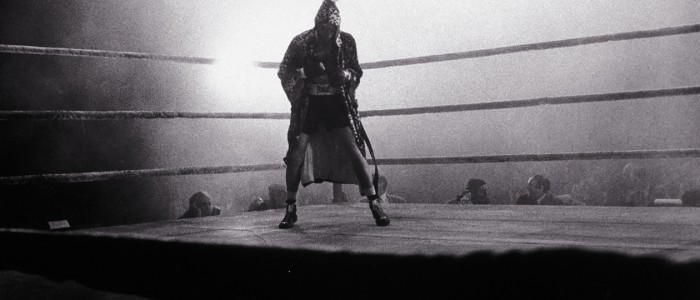 Raging Bull (Featuring director Martin Scorsese and editor Thelma Schoonmaker)Why Listen: So you can learn the story behind so many iconic, unforgettable shots. Scorsese and Schoonmaker dig deep into the bold choices they made with boxer Jake La Motta's (Robert De Niro) story. They provide an endless list of anecdotes, facts, and reasons for their decisions found in this commentary track. They share so many wonderful memories about how many of the film's most famous scenes came about. There was actually a lot of improvisation on Raging Bull, and during some famous scenes, which often made editing the movie difficult because they were sometimes shooting with one camera, not two, during dialogue-heavy scenes.A Day on the Job: When Jake confronts Joey (Joe Pesci), asking him if he slept with his wife, how Scorsese shot the scene was inspired by a scene from Psycho. On the day he shot the scene, De Niro came up with a way of getting a great reaction shot of Pesci, Scorsese recalls:
Raging Bull (Featuring director Martin Scorsese and editor Thelma Schoonmaker)Why Listen: So you can learn the story behind so many iconic, unforgettable shots. Scorsese and Schoonmaker dig deep into the bold choices they made with boxer Jake La Motta's (Robert De Niro) story. They provide an endless list of anecdotes, facts, and reasons for their decisions found in this commentary track. They share so many wonderful memories about how many of the film's most famous scenes came about. There was actually a lot of improvisation on Raging Bull, and during some famous scenes, which often made editing the movie difficult because they were sometimes shooting with one camera, not two, during dialogue-heavy scenes.A Day on the Job: When Jake confronts Joey (Joe Pesci), asking him if he slept with his wife, how Scorsese shot the scene was inspired by a scene from Psycho. On the day he shot the scene, De Niro came up with a way of getting a great reaction shot of Pesci, Scorsese recalls:
Now, you see Joe's reaction to, 'Did you fuck my wife?' That was interesting. Bob came up with...Joe was strong, but he wasn't strong enough. When we got to that point and got to do another take, instead of saying, 'Did you fuck my wife?' Bob said, 'Did you fuck your mom?' That's the reaction Joe came up with, so that's quite genuine. [Laughs] I always find it fascinating working with Bob and people like that who are so inventive with that sort of stuff.
What's Said: Scorsese's movies tend not to have explicit sex scenes. Schoonmaker explains why:
I think one of the things that's quite noticeable about Marty's films is that there's very little what would be called "blatant sex" in them. There is a very strong sexual feeling in the films, but he really avoids actual blatant sex in the scenes. I think he feels it stops the picture. The only time you actually see it is in his early films when he was trying to break into Hollywood and was forced to put scenes like that into his films. For example, Boxcar Bertha or the footage he had to shoot to insert into Who's That Knocking in order to get an American distributor. He was told he wouldn't get an American disturber unless there was a nude scene in it, so he went to Amsterdam and filmed such a scene and inserted it into the film. But by and large, he does avoid nudity and blatant sex. That's why it's always been very amusing to us in the film After Hours we were given a bad rating for 'overall sensuality.' [Chuckles] I guess it proves the power of sexuality he does put into these films is certainly there.
Trivia: Ella Fitzgerald & Louis Jordan's "Stone Cold Dead in the Market" was originally the Raging Bull theme. Then Scorsese was shown the beginning with composer Pietro Mascagni's "Intermezzo" and went with that instead because he thought it captured "people struggling to live."
